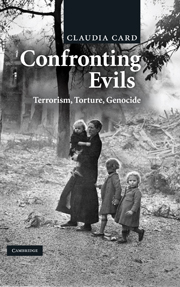Preface and acknowledgements
Published online by Cambridge University Press: 05 June 2012
Summary
This book follows up on work that I began in The Atrocity Paradigm: A Theory of Evil (2002). There I began to develop a theory of evils intended to illuminate well-known atrocities that have occurred during my lifetime. The list is awesome. From my childhood, it includes Auschwitz, medical experiments by Japanese military unit 731 on prisoners and civilians in China, Stalin's gulags, and the firebombings of Japan by the United States. From my schooldays in Wisconsin it includes the Communist purges of Senator Joseph McCarthy and the murders of Ed Gein, said to be the inspiration for Alfred Hitchcock's film Psycho (1960). When I was in graduate school, President John F. Kennedy was assassinated, and the next year three civil rights workers were lynched in Mississippi. During the more than four decades that I have taught at the University of Wisconsin, Martin Luther King, Malcolm X, Robert Kennedy, and Harvey Milk were gunned down, and there were the Biafran war, Idi Amin's dictatorship in Uganda, apartheid in South Africa, the My Lai massacre, the killing fields of Cambodia, mass rape in war, the rise of factory farming in the US, massive destruction of rainforests, the Oklahoma City bombing of 1995, the terror bombings of September 11, 2001, and, closer to my home, the lethal protest bombing of the Army/Math Research Center on my campus in 1970, and the sex-crime murders by Caucasian Jeffrey Dahmer of Asian American youths in Milwaukee, followed by his own murder in 1994 in the prison at Portage, Wisconsin.
- Type
- Chapter
- Information
- Confronting EvilsTerrorism, Torture, Genocide, pp. xi - xviiPublisher: Cambridge University PressPrint publication year: 2010



